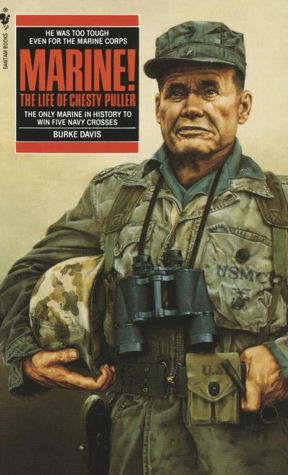
Every night during Boot Camp, after everyone is snuggled into their racks, Marine Corps Recruits end their long day by uniformly saying, "Good Night Chesty, where ever you are!" Lewis "Chesty" Puller embodies the esprit de corps of the USMC. Any Marine worth his salt wants to be like Chesty Puller.
"They are in front of us, behind us, and we are flanked on both sides by an
enemy that outnumbers us 29:1. They can't get away from us now!"
- Lewis B. "Chesty" Puller, USMC
When the Marines were cut off behind enemy lines and the Army had written the 1st Marine Division off as being lost because they were surrounded by 22 enemy divisions. The Marines made it out inflicting the highest casualty ratio on an enemy in history and destroying 7 entire enemy divisions in the process. An enemy division is 16500+ men while a Marine division is 12500 men.
As a Chaplain working with the Marines, reading this biography was insightful and inspirational. Obviously, from a military standpoint, there is much to admire about Lt. General Puller. Dropping out of Military College to enlist during the First World War, Puller fought his way through the conflicts in Haiti, Nicaragua, China, World War II and the Korean War to become the most decorated Marine in history. In addition he fought his way through the ranks to retire as a three star general. If he had not been forced to retire early (for not keeping his mouth shut about the incompetency of the Air Force during the Korean War) he undoubtedly would have earned a fourth star.
"Our Country won't go on forever, if we stay soft as we are now. There won't
be any AMERICA because some foreign soldiery will invade us and take our
women and breed a hardier race!"
-Lt. Gen. Lewis B. "Chesty" Puller, USMC
His wartime achievements are noteworthy, however it was the intangible things that made him great. He was a man of uncompromising character and faithfulness - remaining loyal to his wife (and her to him) through all those long years of fighting. He had the ability to inspire men to joyfully follow him into the valley of the shadow of death, many of them never to return. He knew that direct, firm, commanding authority did not have to be and should not be in conflict with compassionate, selfless leadership. He sowed the seeds of honor, courage, and commitment into his character daily so that when the feces hit the oscilating ventilator he could respond wisely without hesitation.
When an Army captain asked him for the direction of the line of retreat,
Col Puller called his Tank Commander, gave them the Army position, and ordered:
"If they start to pull back from that line, even one foot, I want you to open fire on them."
Turning to the captain, he replied "Does that answer your question?
We're here to fight." At Koto-ri in Korea
- Chesty Puller at Koto-ri in Korea
I'm sure there was some bias to this book, as it rarely had anything negative to say about Puller. But if only half of it was true, Chesty would still be the fiercest warrior and combat officer our country has ever produced. As long as the Marine Corps keeps Chesty as their measuring stick, the USMC will remain America's elite fighting force.
Oorah!
"No officer's life is worth more than that of any man in his ranks. He may have more effect on the fighting, but if he does his duty, so far as I can see, he must be up front to see what is actually going on with his troops. They'd find a replacement for me soon enough if I got hit. I've never seen a Marine outfit fall apart for lack of any one man. I don't want you to go up under the guns just for show. It's only the idiots and the green kids who think they're bullet-proof. But if you don't show some courage, your officers won't show it either, and the kids will hang back. It's that kind of an outfit that always has trouble."
 Reading this will be a new Christmas tradition for me. I love the writing, the suspense, and the redemption found in its pages. If you haven’t read it, I highly suggest it for you. You will see that it is different than you remember.
Reading this will be a new Christmas tradition for me. I love the writing, the suspense, and the redemption found in its pages. If you haven’t read it, I highly suggest it for you. You will see that it is different than you remember.




